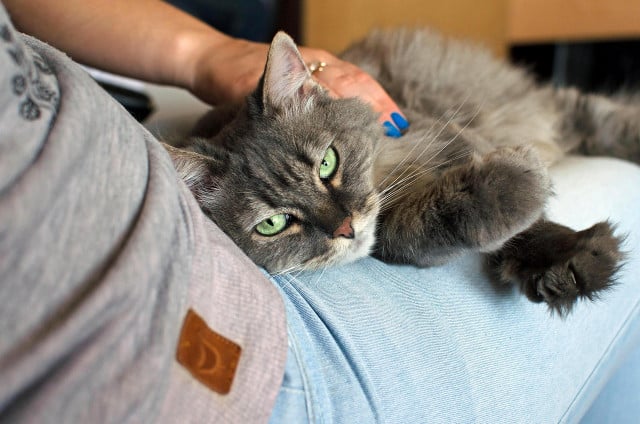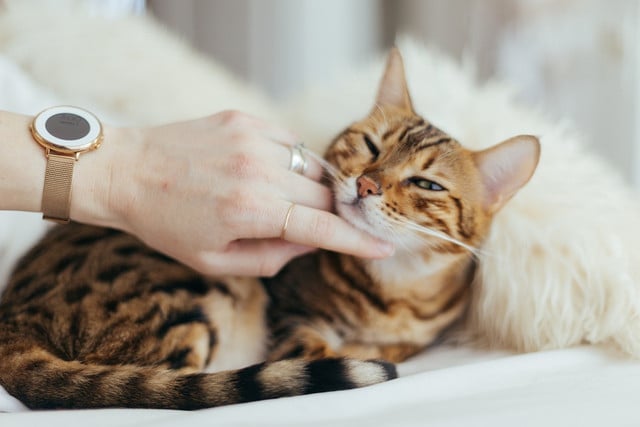Should cats sleep in bed with us or is co-sleeping a bad idea? The recommendations are conflicting and the answer will depend on you and your cat. Find out if it’s right for you.
Letting your cat sleep in bed with you will be a personal choice and will depend on various factors. Your health and the cat’s health will be critically important aspects to consider, as well as issues like the cat’s behavior, personality and sleep cycles. Some experts would oppose allowing cats to sleep in bed with humans, while others even propose that human-animal co-sleeping should be approached as a legitimate and socially relevant form of co-sleeping.
In 2021, 45.3 million American families reported owning a cat. One study shows that between 14-62 percent of pet owners allow dogs and cats on their beds, so should you? Let’s find out.
Natural Sleep Patterns

It has been debated between cat and dog lovers worldwide for years, but it looks as though our feline friends are generally more disruptive to human sleep than man’s most faithful companions. Sleep regulation might be biologically similar for cats and other animals. Still, their innate and unusual sleep-wake cycles might account for them jumping on your tired head at the first hint of daylight in the wee hours of the morning.
Many people think that cats are nocturnal animals because of their tendency to come to life when the sun goes down. Cats are actually crepuscular — which means they are most active during dusk and dawn. According to the Sleep Foundation:
- Cats sleep multiple times per day as opposed to one long sleep period at night — known as a polyphasic sleep pattern.
- More than half of cats sleep between 12 and 18 hours a day.
- Sleep requirements for cats increase with age.
- Cat naps average 78 minutes in length.
- Cats experience two major peaks of activity — one in the early morning before sunrise and one in the evening around sunset.
Cats are active during these periods because of their natural hunting instincts and excellent ability to see in poor lighting. During these hours of poor visibility, cats have an added edge over their prey and can spot rodents and birds — that may not spot them — more easily. Although domestic cats do not have to hunt for their meals, this primitive hunting behavior is still exhibited — making them excitable at times we might rather be sleeping. If your cat likes to chase invisible mice around your bed at all hours, you might want to reconsider letting your cat sleep in bed with you. However, not all cats are disruptive to human sleep and might even be beneficial bed-buddies.
Will I Get Enough Sleep With My Cat In Bed?



Data collected by the Center for Sleep Medicine at the Mayo Clinic in Arizona indicates that over half of pet owners allow their pets to sleep in the bedroom. 20 percent reported that their pet was disruptive to sleep, while 41 percent reported the opposite — finding pets quite beneficial to sleep. Cats have indeed been found to be more disruptive to sleep than dogs in several studies though, and research last year did find a significant association between cat ownership and not reaching the recommended minimum of seven hours of sleep each night.
The reasons for this association are debated by many experts and feline fans all over the world. The reality is that like humans, cats have different personalities, habits and routines. Some cats will love snuggling up to sleep in bed with their owners, while others prefer to pick their own resting spots around the house and will be disruptive if forced into a location against their will. Knowing your cat’s preferences will be important. Some cats love heat and will sleep more soundly against your body heat, while others prefer to lie at your feet, on top of the blankets. For others, even sleeping elsewhere in the same room can provide a therapeutic bonding relationship.
Some now suggest that cats will change their behavior to become in synch with their owners’ routines and rhythms when it comes to sleeping in bed together. An Italian academic study tracking ten domestic cats — five that roamed freely inside and outside, and five that were confined to smaller areas inside — found that the cats in the smaller confines mirrored their owners’ sleeping and waking patterns and developed symbiotic synchronicity with their routines.
Interestingly, a Japanese researcher spent 24 nights getting in synch with her cat’s habits instead of the typical cat sleeping in the human bed arrangement. She monitored the measurable and subjective effects of sleeping in a random location in her house that her cat had chosen. Over the 24 nights, she would lay a sleeping bag at her cat’s chosen location — anywhere from the stairs to her living room floor — and slept there with her feline friend. She monitored her sleep scores and other factors — including the cat’s behavior — throughout.
This researcher found no difference in sleep scores from her baseline and recorded several positive mental benefits during the experience too. She notes that despite being briefly awoken several times due to various movements of the cat, this was not significant enough to show up in the metrics. The study also showed notable differences in the cat’s behavior — including increased affectionate behavior and an increased interest and tendency to sleep in the sleeping bag that the human had been using. This study also documented harmonious synchronicity between the co-sleeping pair — indicating that sleeping relationships can balance and harmonize over time.
Is Disease A Factor To Consider?



A zoonosis is an infectious disease that has jumped from an animal to humans. This issue is probably the most serious concern when considering letting a cat sleep in bed with you or a family member. According to the World Health Organization (WHO), there are over 200 known variations of these diseases, and they do comprise a large percentage of new and existing human diseases.
According to the Centers for Disease Control and Prevention (CDC), zoonotic infections acquired by sleeping with a domestic pet are rare. Many are also completely preventable through vaccination, hygiene and proper veterinary care. The CDC does highlight though, that transmission of disease from cats is not impossible. They recommend that children and immunocompromised people should not let their pets share their beds. These recommendations are based primarily on rare, historical cases of serious zoonoses transmission that include:
- Cases of bubonic plague that were linked to sleeping with flea-infested and sick cats.
- A case of meningitis in a newborn that was associated with a pet cat stealing the baby’s pacifier and using it as a toy.
- Chagas disease — an inflammatory, infectious disease caused by the parasite Trypanosoma cruzi — that had been transmitted by sleeping with cats (and dogs).
- Cases of cat-scratch disease — transmitted to humans when they are scratched by a cat that harbors Bartonella henselae–infected fleas and flea feces — from sleeping with or being licked by a household cat.
Other zoonotic cat-related diseases, still seen today and to be aware of, include:
- Campylobacteriosis — a common cause of diarrhea, affecting over one million people in the US annually
- Tapeworm, hookworm and roundworm
- Rabies
- Toxoplasmosis — an infection caused by a single-celled parasite called Toxoplasma gondii that more than 40 million people in the United States may be infected with, according to the CDC.
Disease transmission is just one of many reasons you should never keep exotic pet cats. For our good-old domestic cats though, regular trips to the vet, deworming, flea and tick treatment, and adherence to vaccination schedules is essential if you decide to let your cat share your bed. Unlike dogs, cats generally show clinical signs of infection and flea infestation that could serve as a warning if you regularly assess your cat’s health status. Hygiene, safe handling of litter, and adherence to a veterinary regime will significantly minimize your risk of contracting anything by sleeping with your cat in bed.
Allergies Are A Two-Way Street



According to the Ohio State University, cats and dogs are responsible for an estimated 15 to 30 percent of allergies, with cat allergies being twice as common as dog allergies among humans. Allergies to cats are primarily caused by a single protein found on the skin and in the saliva, but seven other proteins can trigger reactions to cats and their dander.
Letting a cat sleep in bed with you will prolong your exposure to these allergens and we recommend seeing a medical professional for advice about how to best manage your cat-owner relationship. Other tips from the Ohio State University include:
- Spay or neuter your cat to decrease allergen production.
- Avoid owning multiple cats because more cats reduce the concentration of allergens in the household.
- Bathe your cat weekly.
- Always wash your hands immediately after handling your pet.
- Restrict cats from rooms you spend most of your time in.
- When possible, replace carpet with smooth flooring as carpet can contain 13 times more cat allergens than smooth floors.
It’s important to remember that your cat could be allergic to you or other allergens in your bed and bedroom. Our mattresses and bedding can contain large volumes of human dander and other common triggers — like detergents and dust particles. Cat allergies usually manifest as miliary dermatitis — small scabs or missing hair, typically around the head and neck — but other common allergy symptoms can occur. Do not sleep in bed with your cat if you or it exhibit any allergy symptoms and limit your exposure to triggers or each other.
Why Should I Let My Cat Sleep In Bed With Me?



Scientific research shows that just owning a cat has multiple benefits — including improved mental and physical health, reduced risk of cardiovascular disease, improved heart health, alleviation of social isolation and loneliness, and stress reduction. Even just pet engagement has promising effects on preventing depression in older people and owning a cat is associated with improved psychological health generally.
The most extensive cross-sectional study carried out to date examined the views of 6,575 pet-owning (dogs and cats) participants. The research revealed that overall, pet owners feel more positive about their neighborhood, exercise more, and fall asleep more easily than non-pet owners. Living with cats can also strengthen a child’s immunity in the first year of life and support people with autism and their families.
Sleeping with cats has the potential to expand these benefits even further and their iconic purr might be the reason why. The constant rhythmic vibration helps to relieve stress, and lower blood pressure. In fact, purr frequencies correspond to vibrational/electrical frequencies used to treat many painful conditions, including:
- Bone growth
- Healing fractures
- Pain reduction
- Swelling
- Muscle growth
- Muscle strain
- Joint flexibility
- Difficulty breathing
So, it looks as though a healthy happy cat and a healthy, happy owner in the same bed can offer a range of benefits, but is not without challenges too. If you really want to enjoy the benefits of allowing your cat to sleep in bed with you, but its behavior is indeed disruptive, you can try the following to help improve the situation:
- Avoid rewarding the disruptive behavior — even with your attention.
- Make time during the day — and before bedtime — for exercise and stimulation.
- Don’t punish disruptive behavior, just put the cat out of your bedroom and close the door to condition towards calmness in the bedroom and activity elsewhere.
- Be patient and try to establish a routine.
- Maintain boundaries and do not allow your cat to gain dominance over the sleeping quarters.
Read more:
- 5 Animal Attractions You Should Skip This Vacation
- Why Not to Flush Flushable Cat Litter
- How to Keep Your Cat Off Your Christmas Tree this Year
Important Information regarding Health-related Topics.
** Links to retailers marked with ** or underlined orange are partially partner links: If you buy here, you actively support Utopia.org, because we will receive a small part of the sales proceeds. More info.Do you like this post?






